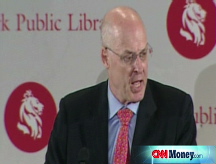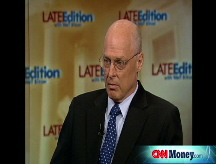Paulson to Congress: Pass rescue plan
Treasury Secretary says proposal is key to restoring confidence in mortgage finance giants Fannie Mae and Freddie Mac.
NEW YORK (CNNMoney.com) -- Treasury Secretary Henry Paulson urged Congress Tuesday to approve the Bush administration's plan to back up mortgage financiers Fannie Mae and Freddie Mac.
Speaking in New York the day before the House is expected to take up the proposal, Paulson said it's crucial that the companies have access to the capital they need to maintain their operations and regain the public's confidence.
"Their continued activity is central to the speed with which we emerge from this housing correction and remove the underlying uncertainty in our financial markets and financial institutions," Paulson said.
"Now, more than ever, we need Fannie and Freddie out there, financing mortgages," he added. "That means we must, in the short term, take steps to boost confidence in the [companies], while also taking steps to address the potential systemic risk they pose."
The recovery, however, will take time, Paulson said.
"We have been experiencing more bumps recently, and until the housing market stabilizes further we should expect some continued stresses in our financial markets," he said. "Working through the current turmoil will take additional time, as markets and financial institutions continue to reassess risk and reprice securities across a number of asset classes and sectors."
The administration on July 13 unveiled a plan to inject untold billions of dollars into Fannie and Freddie by temporarily increasing their line of credit with Treasury and allowing Paulson's agency to buy stock in the mortgage giants. The secretary has stressed that the two may never need to draw upon the funds, but that the proposal should calm the roiling markets by making it clear the government stands behind the companies.
The plan could cost the federal government $25 billion over fiscal years 2009 and 2010, according to a report released Tuesday by the Congressional Budget Office. It noted the cost could vary widely depending on the extent of the bailout, if any is needed at all.
Paulson also wants Congress to endorse the creation of a new regulator for Fannie and Freddie, which would keep a closer eye on the companies' operations. The Federal Reserve should have a consulting role in setting capital requirements and other standards, he said.
Fannie and Freddie investors had mixed reactions to the speech and CBO report. Fannie (FNM, Fortune 500) closed down about 5% and Freddie (FRE, Fortune 500) finished up 11%.
Freddie and Fannie are critical to the revival of the United States housing market. The two provide much-needed funding for banks and lenders, who can no longer turn to investors to buy pools of mortgage loans. Freddie has already indicated it might have to reduce its purchases of home loans, which would make it even more difficult and expensive for Americans to obtain mortgages.
Set up by Congress to encourage homeownership but spun off as private companies owned by shareholders, Fannie and Freddie own or guarantee more than $5 trillion in home loans. This is about half the mortgages in the United States.
Responding to a question about how the taxpayer would be protected if the government has to bail out the companies, Paulson said Congress should not put restrictions on Treasury's rescue plan because greater flexibility engenders greater support in the capital markets.
"It minimizes the likelihood they'll be used," he said, referring to the bailout measures.
Paulson's speech comes as Congress is poised to vote on the housing rescue plan. The House is expected to take up the proposal on Wednesday. House Financial Services Chairman Barney Frank, D-Mass., and others have said they are concerned about giving the Treasury department a blank check to bail out Fannie and Freddie.
Tuesday's speech comes a day after Paulson spent time with Wall Street chief executives discussing the current economic situation. He also took a weekend tour of the talk show circuit, appearing on CNN and CBS on Sunday to drum up support for the plan.
Looking beyond the current turmoil, Paulson said Wall Street needs to consider a more significant overhaul of the financial market operations and the regulation of the industry. That way, problems at one institution - be it a mortgage finance company, a hedge fund or a brokerage firm such as Bear Stearns - doesn't threaten to upend the entire sector.
"Looking beyond today's market challenges, we need to get to a point where large, complex financial institutions are not perceived to be too big or too interconnected to fail," he said. ![]()





